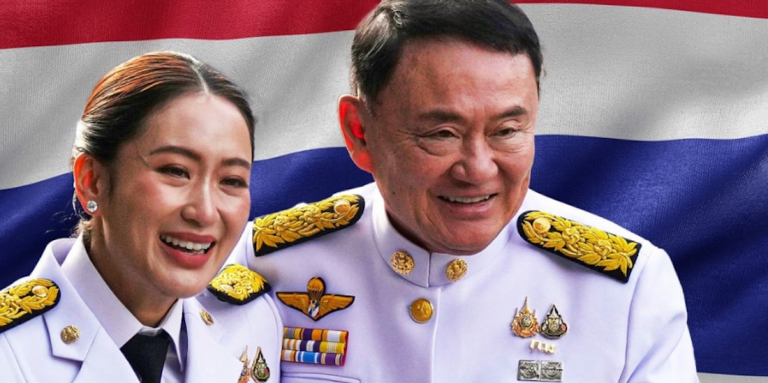
A constitutional breach involving a private call with Cambodia’s former leader ends the Shinawatra Dynasty, deepening Thailand’s protracted political instability.

New York, N.Y. — The nine judges of Thailand’s Constitutional Court delivered a seismic verdict on Friday, voting six to three to remove Prime Minister Paetongtarn Shinawatra from office for ethics violations stemming from a leaked private phone call with Cambodia’s former long-ruling strongman, Hun Sen.
The ruling immediately plunged the nation into fresh political turmoil and marked a severe blow to the enduring, yet besieged, political dynasty founded by her father, the exiled billionaire Thaksin Shinawatra.
The case centered on a June phone conversation, the audio of which was publicly released by Hun Sen himself. In the recording, the 39-year-old prime minister could be heard referring to the Cambodian leader as “uncle” and offering criticisms of the Thai army. The call occurred against a backdrop of rapidly escalating military tensions along the two nations’ disputed border, which weeks later erupted into a deadly five-day conflict that killed dozens of soldiers and civilians and displaced hundreds of thousands of people.
In its written ruling, the court determined that Paetongtarn’s “personal relationship” with Hun Sen “appeared to align with Cambodia’s interests” over those of Thailand. The judges dismissed her defense that the call was a good-faith, “personal negotiation to… bring back peace without using violence,” stating it instead “caused the public to cast doubt” on her loyalties and whether her actions “would benefit Cambodia more than the nation’s interest.”
The ousted leader publicly acknowledged the court’s verdict but stood by her actions. “From the first day I took this office, my every action has been for the benefit of the people,” she stated in a televised address from Government House. “My intention in that private discussion was solely to save lives and prevent violence, drawing upon a long-standing personal connection to achieve peace. I maintain that this was in the nation’s best interest.”
A Fraught Border and a Familial Connection
The leaked call exposed the deeply personal and political complexities of Southeast Asian diplomacy. Hun Sen was once a close ally of Paetongtarn’s father, Thaksin, during his premiership in the early 2000s. The Shinawatra family’s populist policies and immense wealth have long made them adored by the rural poor and reviled by the Bangkok-centric elite, the military, and the royalist establishment, leading to two previous premiers being removed from office.
This familial history provided the subtext for the court’s decision. The use of the familiar term “uncle” and the criticism of the Thai military—a sacrosanct institution—were deemed by her critics as evidence of a cavalier attitude toward national security and a conflict of interest. “A prime minister cannot have a private foreign policy, especially with a nation we have a volatile border with,” said Prawit Wongsuwon, leader of the Palang Pracharath party and a former army chief. “It was a profound error in judgment that compromised her position.”
The Shinawatra Curse and Judicial Intervention
Paetongtarn Shinawatra becomes the fifth Thai prime minister to be dismissed by the Constitutional Court since 2008 and the third member of her family to have a premiership cut short. Her father, Thaksin, was deposed by a military coup in 2006, and her aunt, Yingluck Shinawatra, was removed by the same court in 2014 for abuse of power over a rice subsidy scheme. Thaksin, who returned from a 15-year exile last year under a controversial deal with his former rivals, has seen his influence wane considerably with his daughter’s dismissal, raising questions about the future of the Shinawatra political machine.
Her own rise to power was itself a product of judicial intervention. She assumed the leadership of the Pheu Thai party and became prime minister only after her predecessor, Srettha Thavisin, was dismissed by the court for illegally appointing a cabinet member who had a prior conviction.
A Swift Realignment of Power
The vacuum of power was filled with astonishing speed. Within hours of the verdict, the conservative Bhumjaithai party, a one-time coalition partner in Paetongtarn’s government, announced it had secured enough support from other parties to form a new government. Its leader, Anutin Charnvirakul, is now poised to become the next prime minister.
The party, which has strong influence in the northeast, had earlier outlined its top priorities, which include resolving the ongoing border dispute with Cambodia and dissolving parliament to call for new elections within the next four months. This rapid shift underscores the fragile and transactional nature of Thai coalition politics, where alliances are quickly made and broken.
Regional Implications and a Diplomatic Spat
The fallout extends beyond Thailand’s borders, significantly straining relations with Cambodia. The act of Hun Sen—who ceded power to his son, Hun Manet, last year but is widely believed to still control the government—leaking a private diplomatic call is viewed as a profound breach of diplomatic protocol. Analysts suggest it was a calculated move, possibly intended to destabilize a Thai government led by a family he once considered friends, or to gain leverage in the border negotiations.
“This is an unprecedented level of diplomatic sabotage,” said Thitinan Pongsudhirak, a professor of political science at Chulalongkorn University. “Hun Sen has effectively intervened directly in Thai domestic politics with severe consequences. It will take a long time to rebuild any semblance of trust between the two capitals.”
The Unending Cycle of Thai Politics
The court’s decision reinforces a persistent pattern in modern Thai history: elected governments, particularly those affiliated with the Shinawatras, are systematically challenged and often removed by the nation’s unelected institutions, including the judiciary and the military. This cycle has prevented any single elected government from completing a full term in over two decades, creating a perpetual state of political uncertainty that has hampered economic growth and deepened social divisions.
For millions of the Shinawatras’ “Red Shirt” supporters, the verdict is the latest evidence of an entrenched establishment using its power to nullify the will of the voters. Protests are planned for the weekend in the party’s stronghold in the northeast, with leaders decrying what they call a “judicial coup.”
As Anutin and Bhumjaithai move to consolidate power, the nation is left to grapple with the same fundamental tensions that have defined it for a generation. The removal of Paetongtarn Shinawatra is not merely a change in leadership; it is the latest eruption of a deep-seated conflict between the elected will of the majority and the power of the old guard, a conflict that shows no signs of abating.
Summary
Thailand’s Prime Minister Paetongtarn Shinawatra has been removed from office by the Constitutional Court for ethics violations related to a leaked phone call with Cambodia’s former leader Hun Sen. The court ruled her private discussion during a border crisis undermined national trust. Her removal continues a pattern of judicial intervention against Shinawatra family leaders and triggers a rapid political realignment, with the Bhumjaithai party moving to form a new government.
#Thailand #PaetongtarnShinawatra #ThaiCrisis #ConstitutionalCourt #HunSen
#Cambodia #PheuThai #Bhumjaithai #SoutheastAsia #PoliticalInstability
TAGS: Thailand politics, Paetongtarn Shinawatra, Constitutional Court, Cambodian-Thai relations,
Pheu Thai party, Bhumjaithai party, Anutin Charnvirakul, Thai military, judicial coup, Hun Sen
